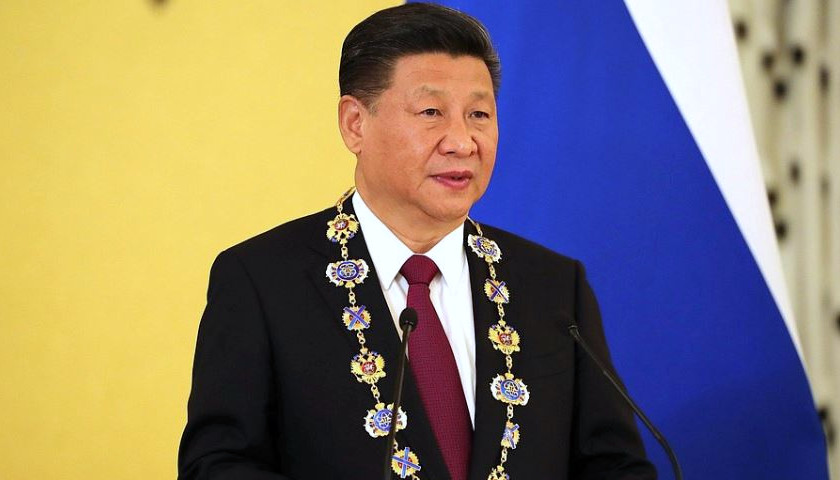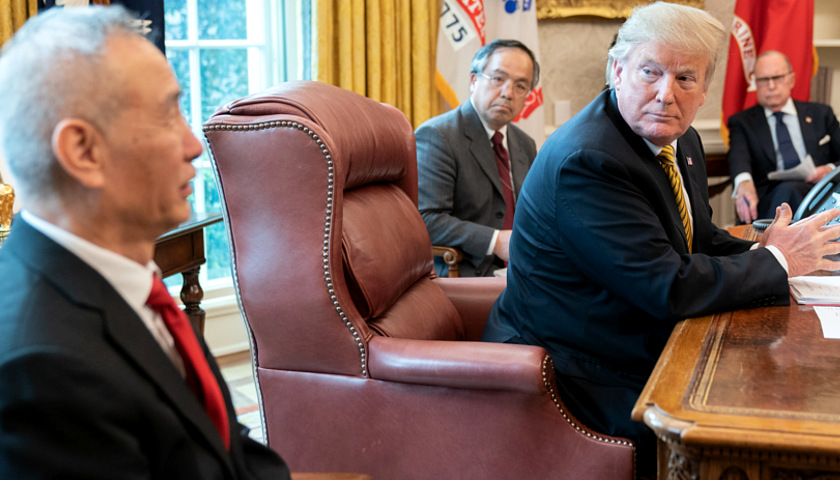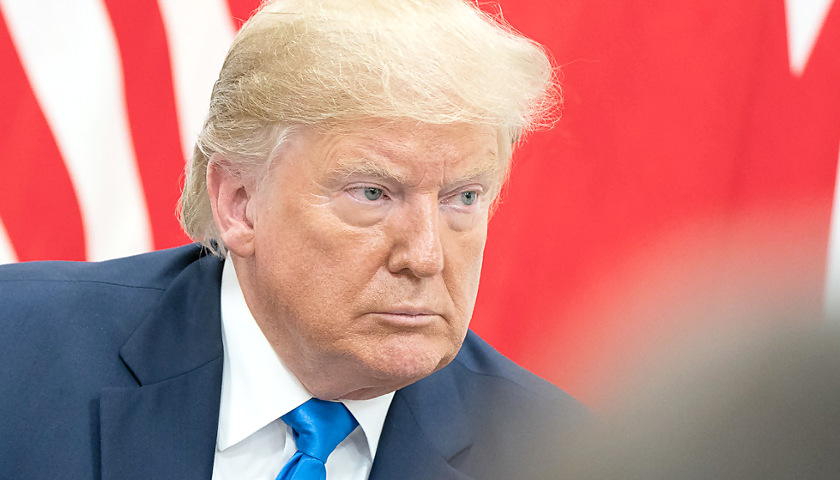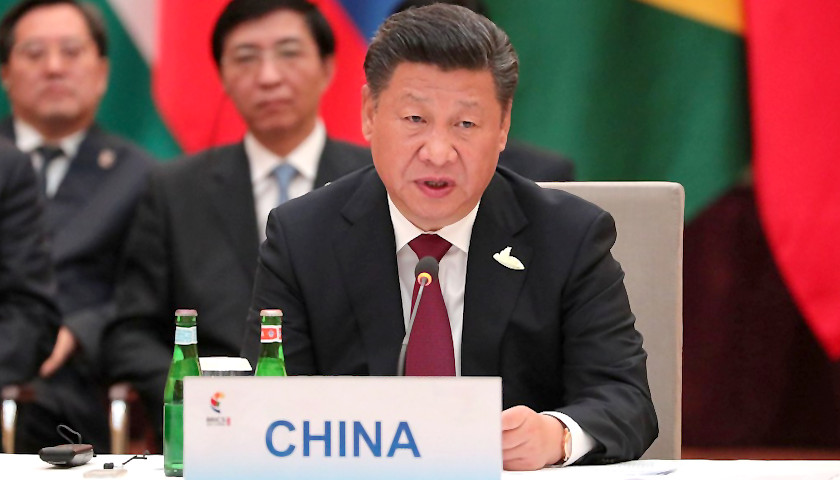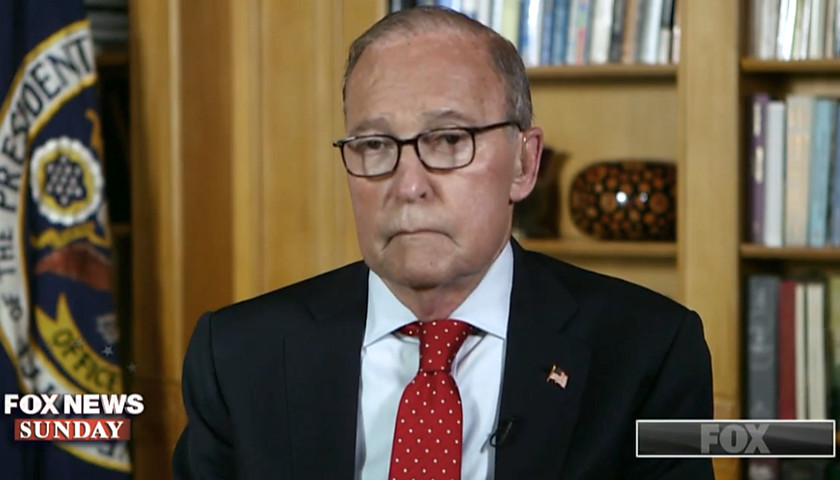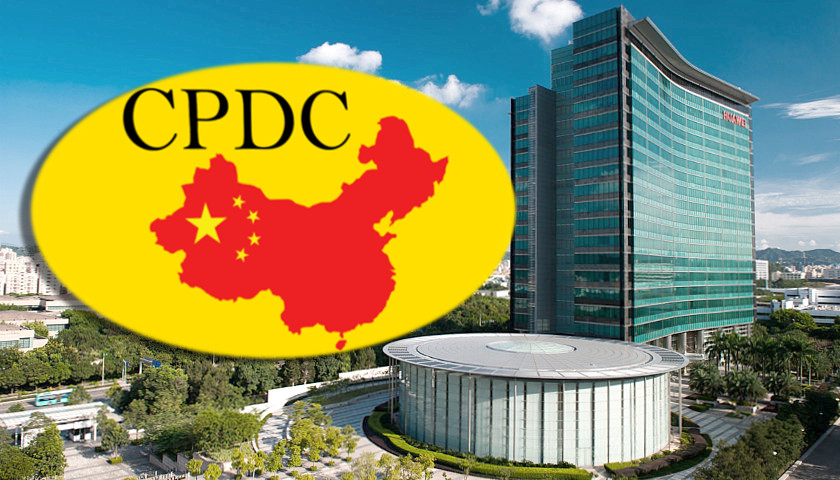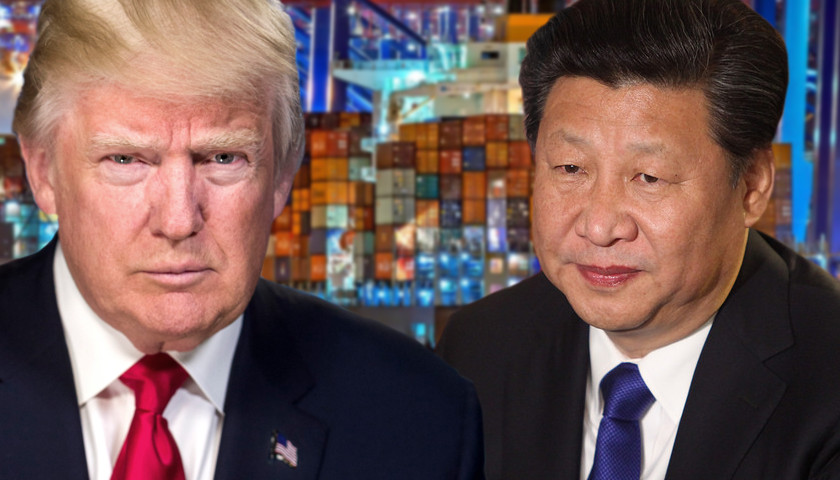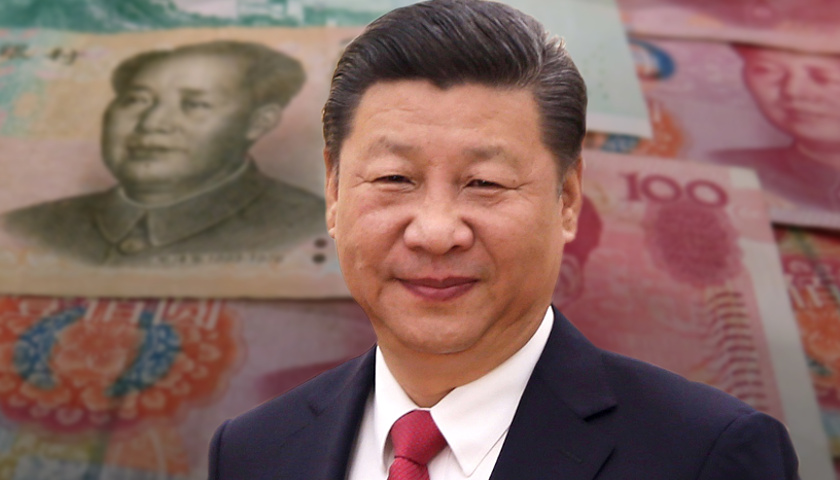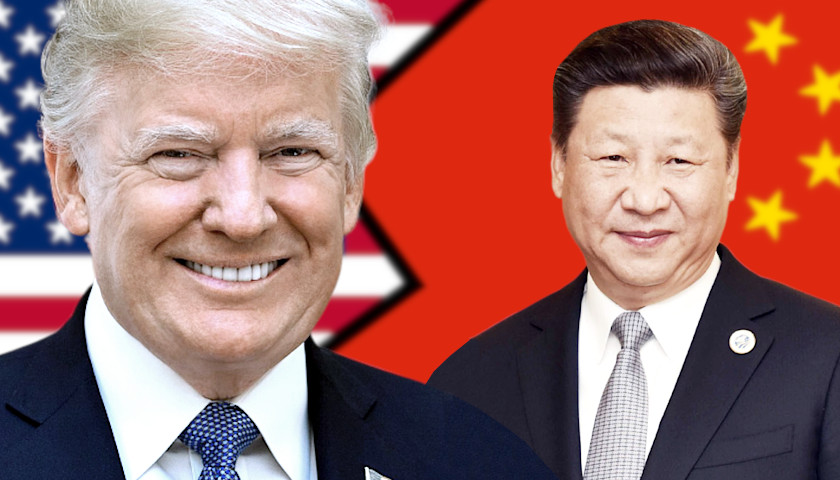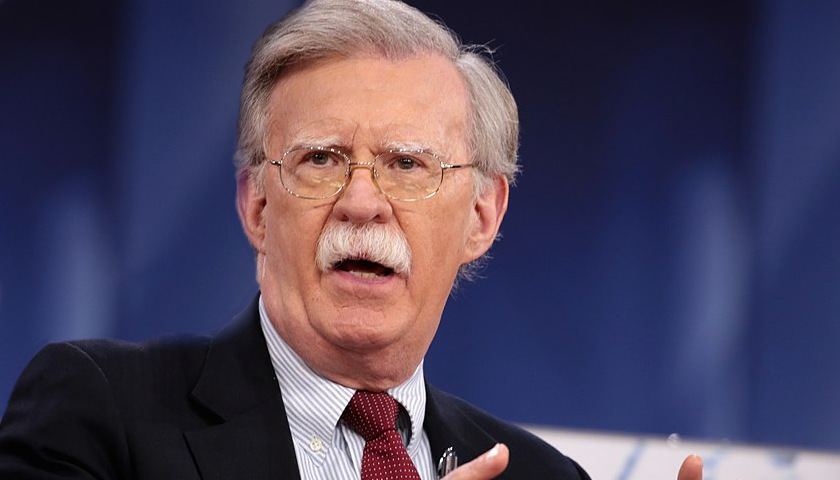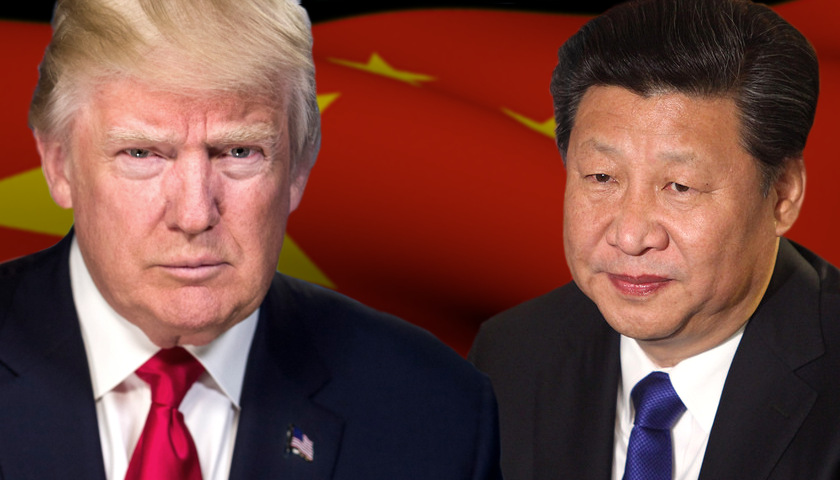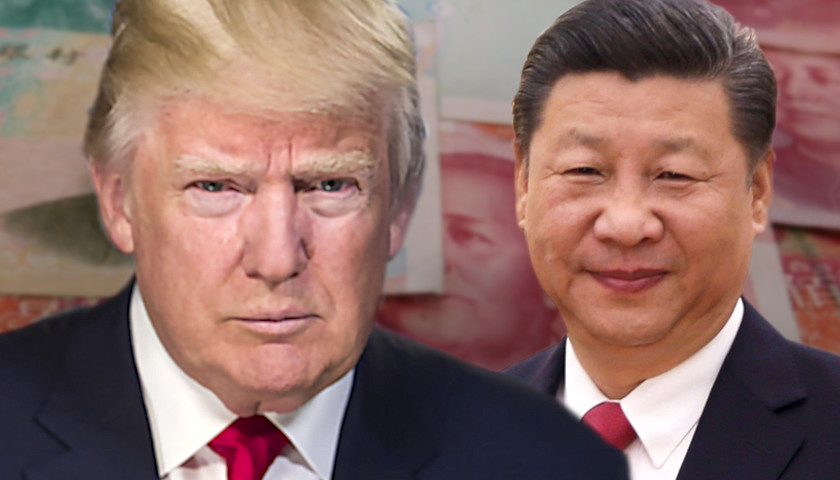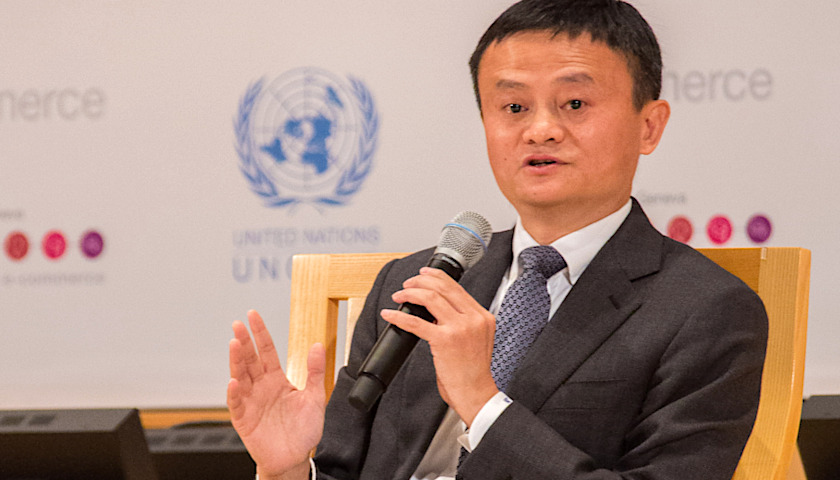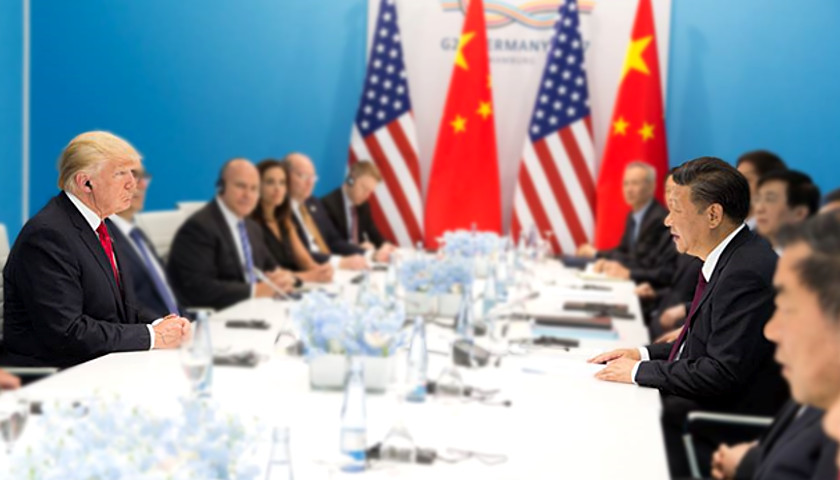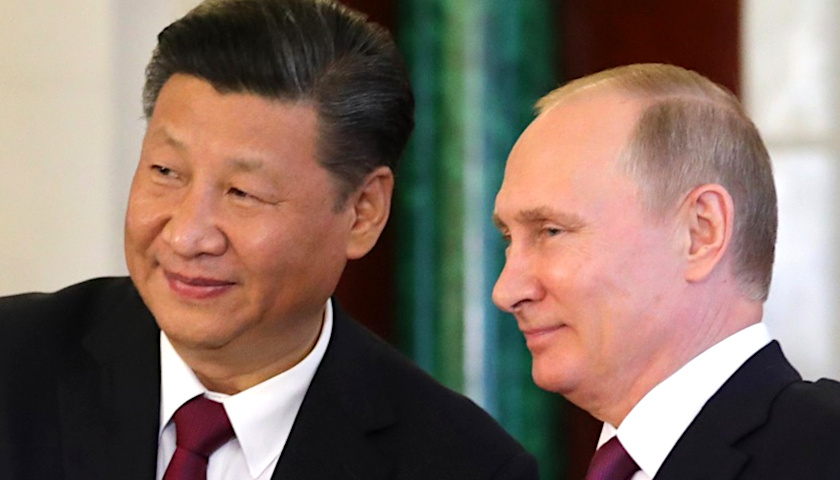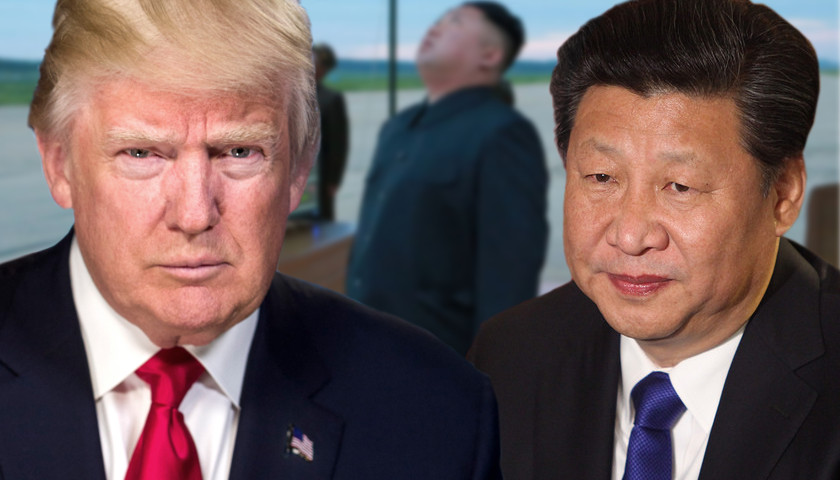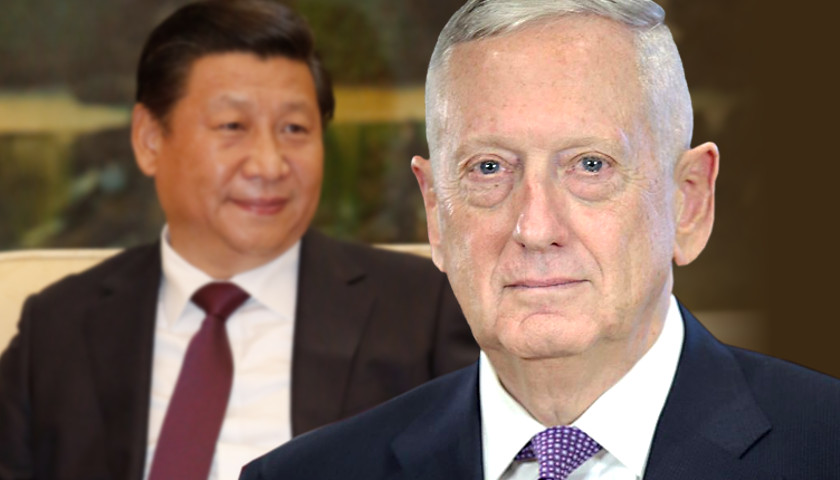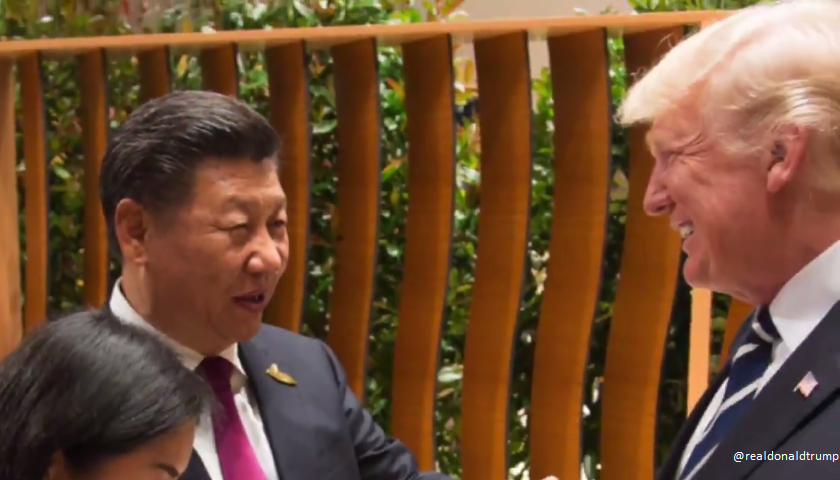Congregations in China’s officially recognized Protestant church have been forced to replace God’s commandments to Moses with a quotation about the triumph of socialism, according to a religious liberty watchdog. The action literally substitutes socialism as an idol, in violation of the First Commandment. The Chinese government’s attempt to change the teachings of the 60,000-church Three-Self Patriotic Movement unmasks how socialism crushes religious liberty and reduces Christians to subservience – or elevates them to martyrdom.
Read the full storyTag: Xi Jinping
Trump on Tariffs: ‘We Don’t Want to Be Servants to the Chinese!’
The U.S. imposed a 15% tariff Sunday on Chinese imports valued at $111 billion in 2018 including tools, apparel, footwear and electronics, The Wall Street Journal reported.
Read the full storyCountering China, Trump Seeks to Increase Domestic Production of Rare Earths
President Donald Trump recently invoked a provision of the Defense Production Act to ensure the timely delivery of rare earth materials to the nation’s industrial base. Having made the determination rare earths are “essential to national defense,” Trump authorized a wave of potential investment in the industry.
Read the full storyREVIEW: The Ghosts in Xi Jinping’s China Dream
Early on in Ma Jian’s new novel the main character has a vision: I saw elderly men and women smashing rocks against the ground under the steely gaze of teenage Red Guards. Among the sweat-drenched faces caked in dust, I saw my father looking up at me. There are many anguished recollections in the book but this one carries a special poignancy. It is central to a story that shows how the personal (with a hint of parricidal guilt) and the social (an ancestral culture) were torn to pieces in a murderous, ideological frenzy in the service of Mao Zedong’s “struggle against all incorrect ideas and actions.” Under President for life Xi Jinping, that struggle continues today in China, only with much better technology. “China Dream” – the novel takes its title from Xi Jinping’s “national rejuvenation” program of the same name – traces the progressive psychic disintegration of Ma Daode, director of the newly created China Dream Bureau in the provincial city of Ziyang. It is a work of fiction, but could equally be read for what it is: a scathing report on the political and cultural pathologies that are plaguing present-day China. Boozy, potbellied, corrupt, beset by…
Read the full storyWhite House: Trade Agreement with China Not Close
by Ken Bredemeier White House economic adviser Larry Kudlow said Sunday resumption of trade talks between the U.S. and China “is a very big deal,” but acknowledged there is no immediate prospect for an agreement between the world’s two largest economies. “The talks will go on for quite some time,” Kudlow told the Fox News Sunday interview show. He said the countries had reached agreement on 90 percent of a new deal by early May, before talks broke down in what has turned out to be a seven-week stalemate. U.S. President Donald Trump and Chinese President Xi Jinping agreed Saturday on the sidelines of the Group of 20 economic summit in Japan to restart negotiations. Watch the latest video at foxnews.com But Kudlow assessed that “the last 10 percent could be the toughest,” with such unresolved issues as cyberattacks, Chinese demands that U.S. companies turn over proprietary technology they use, Chinese government support for its companies and the sale of U.S. technology components to the giant Chinese multinational technology giant Huawei. Trump agreed in his meeting with Xi to ease sales of some U.S.-made components to Huawei, a policy change that some of Trump’s Republican colleagues in the U.S. disagree with because…
Read the full storyPublic Policy Group Calls for Ban on Sale of All U.S. Equipment to Huawei, Which is Accused of Having Ties to People’s Liberation Army, Chinese Communist Party
In the wake of President Donald Trump’s meeting with China’s Xi Jinping in Osaka, Japan Saturday, the Committee on the Present Danger: China (CPDC) called for a halt to the sale of all U.S. equipment to the Huawei communications company. Trump announced that “U.S. companies can sell their equipment to Huawei. I’m talking about equipment where there is no great national emergency problem with it,” CPDC said in a press release. The Committee on the Present Danger: China said it believes that all provision of products and services and licensing of technology to Huawei undermine the security of the United States, its allies, and partners. CPDC said it agrees with the findings of Trump’s executive order of May 15, 2019 titled “Securing the Information and Communications Technology and Services Supply Chain.” This order addressed the threat posed by “foreign adversaries.” Huawei, a state-owned enterprise with known ties to the People’s Liberation Army, is such an adversary, the committee said. U.S. Secretary of State Mike Pompeo in May accused the head of Chinese telecommunications giant Huawei Technologies of lying about his company’s relationship with the government in Beijing, Battleground State News said. Huawei, the world’s largest maker of telecommunications network equipment, is…
Read the full storyTrump Threatens New China Tariffs If Xi Doesn’t Talk Trade with Him
U.S. President Donald Trump threatened Monday to impose tariffs on another $325 billion worth of imported goods from China if Chinese President Xi Jinping does not engage in new trade talks with him later this month. Trump told CNBC he expects to meet with Xi in Osaka, Japan at the G-20 meeting of the leaders of the world’s largest economies on June 28-29, but Beijing has not publicly confirmed the meeting. Trump said he would impose the new tariffs, on top of tariffs he already has levied on $200 billion worth of Chinese exports, if Xi skips the meeting. “I think he’ll go,” Trump said. “We’re expected to meet.” The U.S. leader said, “China very much wants to make a deal, more than I do.” But months of trade talks between the world’s two largest economies have stopped, at least for the moment. Washington has accused Beijing of reneging on various terms the United States thought they had agreed on, although China has rejected the claim. China’s Foreign Ministry said, “We do not want a trade war, but we are not afraid of fighting one. If the U.S. is ready to have equal consultations, our door is wide open.…
Read the full storyChina Imposes Tariffs on $60 Billion in U.S. Exports in Response to President Trump’s $500 Billion Tariff Hike
China said Monday it would impose tariffs on $60 billion worth of imports from the United States, retaliating after President Donald Trump boosted taxes on $200 billion worth of Chinese goods sent to the U.S. and moved to impose duties on another $300 billion of Chinese exports. The Chinese finance ministry said its new 5% to 25% tax would be imposed June 1 and affect 5,140 U.S. products exported to China. Beijing said its response was targeting “U.S. unilateralism and trade protectionism.” “China will never succumb to foreign pressure,” the foreign ministry said. “We are determined and capable of safeguarding our legitimate rights and interests. We still hope that the U.S. will meet us half way.” The new Chinese taxes came hours after Trump, on Twitter, urged China not to strike back, claiming that “China has taken so advantage of the U.S. for so many years, that they are way ahead (Our Presidents did not do the job). Therefore, China should not retaliate-will only get worse!” The escalation of the tit-for-tat tariff increases had an immediate effect on the U.S. stock market, with the key Dow Jones Industrial Average plunging more than 2% in mid-day trading in New York.…
Read the full storyCommentary: China Left Trump with Little Choice but to Put 25 Percent Tariffs on $200 Billion of Goods
by Robert Romano Just when it appeared that a new trade agreement with China was being finalized last week, Beijing abruptly attempted to change all the terms of the deal and walk back prior concessions that had been made to head off President Donald Trump’s threat to increase tariffs from 10 percent to 25 percent on $200 billion of goods. The changes had arrived on May 3 late in the evening and blew up months’ worth of negotiations. According to Reuters’ David Lawder, Jeff Mason and Michael Martina, “In each of the seven chapters of the draft trade deal, China had deleted its commitments to change laws to resolve core complaints that caused the United States to launch a trade war: Theft of U.S. intellectual property and trade secrets; forced technology transfers; competition policy; access to financial services; and currency manipulation.” It was an unacceptable situation. China was reneging on the deal. Trump had already delayed the 25 percent tariffs in January to give negotiations a chance to make a breakthrough. Then, on the eve of concluding the agreement, Beijing wanted to do a complete 180 on everything that had already been discussed. Instantaneously, and in response, on May…
Read the full storyTrump: US to Impose Higher Tariffs on Chinese Exports
President Trump, looking to pressure China to speed up talks on a new trade agreement, says that starting Friday he will impose sharply higher tariffs on billions of dollars of Chinese exports to the United States. Trump said Sunday on Twitter, “For 10 months, China has been paying Tariffs to the USA of 25% on 50 Billion Dollars of High Tech, and 10% on 200 Billion Dollars of other goods. These payments are partially responsible for our great economic results.” He said, “The 10% will go up to 25% on Friday. 325 Billions Dollars of additional goods sent to us by China remain untaxed, but will be shortly, at a rate of 25%. The Tariffs paid to the USA have had little impact on product cost, mostly borne by China. The Trade Deal with China continues, but too slowly, as they attempt to renegotiate. No!” ….of additional goods sent to us by China remain untaxed, but will be shortly, at a rate of 25%. The Tariffs paid to the USA have had little impact on product cost, mostly borne by China. The Trade Deal with China continues, but too slowly, as they attempt to renegotiate. No! — Donald J.…
Read the full storyDespite Further Talks, No US-China Deal Yet
President Trump and the vice premier of China confirmed on Thursday that while significant progress has been made, there is no new trade agreement yet between the world’s two largest economies. “We’re certainly getting a lot closer,” Trump said sitting at his desk in the Oval Office with Chinese Vice Premier Liu He alongside him. Announcement of a deal could come in “the next four weeks, maybe less, maybe more” and at that time, something “monumental could be announced,” he said, adding, “We are rounding the turn. We’ve made a lot of progress.” Liu, speaking in English, praised the direct guidance of Trump and Chinese President Xi Jinping, adding: “Hopefully, we’ll get a good result.” Trump said if a deal can be reached, then he will hold a summit with Xi. “If we have a deal, there will be a summit,” he said. “I look forward to seeing President Xi. It’ll be here.” Intellectual property protection, as well as certain tariffs remain under discussion, Trump confirmed. “Some of the toughest things have been agreed to,” he added. Asked to make a comment by the president about the status of the negotiations, U.S. Trade Representative Robert Lighthizer was more cautious, replying,…
Read the full storyDespite Current Tariffs, the US Can Expect a Trade Deficit of $410 Billion with China
by Robert Romano Last month, China reported growth of its economy in 2018 at 6.6 percent, the lowest in 28 years. The slowdown is real enough but whether it results in a grand trade deal by the U.S. and China may depend on how much pain China is really feeling at the moment. Is Beijing feeling the pinch? Currently, the U.S. is levying 10 percent tariffs on $200 billion of Chinese goods shipped to the U.S. that came atop a 25 percent tariff on $50 billion of goods from China. While the talks were ongoing, Trump gave China a 90-day reprieve from the 10 percent tariff also rising to 25 percent, which was supposed to happen at the beginning of the year. That’s the U.S. leverage. If the U.S. and China do not reach an agreement, then the tariff will more than double. On the other hand, 2017 set a record for the trade deficit in goods with China at $377 billion according to the Census Bureau. 2018 will be even worse. Excluding November and December data not yet available for 2018, the goods trade deficit from Jan. 2017 to Oct. 2017 was $309.3 billion. For Jan. 2018 to Oct. 2018, it…
Read the full storySecurity Adviser Bolton Vows Tougher Approach to China
Reuters National security adviser John Bolton has vowed to further intensify the Trump administration’s tough approach to China, saying Beijing’s “behavior needs to be adjusted in the trade area, in the international, military and political areas.” Speaking in a radio interview on the Hugh Hewitt Show recorded Thursday and aired Friday, Bolton said President Donald Trump believed China had taken advantage of the international order for far too long and not enough Americans had stood up to it. “Now’s the time to do it” he said. Bolton said Trump’s tough approach toward China, a country the administration saw as the “major issue this century,” had left Beijing “confused.” “They’ve never seen an American president this tough before. I think their behavior needs to be adjusted in the trade area, in the international, military and political areas, in a whole range of areas,” he said. “Perhaps we’ll see at the G-20 meeting in Argentina next month Xi Jinping willing to come to talk turkey on some of these issues,” he added. Bolton’s remarks came amid a series of administration broadsides against China that goes beyond a trade war. These have included accusing Beijing of trying to undermine Trump ahead of…
Read the full storyPresident Trump Tells China ‘No Deal’ on Trade
by Robert Romano “Now look, China wants to make a deal, and I say they’re not ready yet. I just say they’re not ready yet. And we’ve canceled a couple of meetings because I say they’re not ready to make a deal. We can’t have a one-way street. It’s got to be a two-way street. It’s been a one-way street for 25 years. We gotta make it a two-way street. We’ve got to benefit also.” That was President Donald Trump’s declaration to China on Oct. 9 that there won’t be a deal on trade anytime soon. Not while the U.S. is running a $375 billion trade in goods deficit every year. So far, Trump is levying 10 percent tariffs on $200 billion of Chinese goods shipped to the U.S., rising to 25 percent in Jan. 2019. That came atop a 25 percent tariff on $50 billion of goods from China. And Trump did warn that if China retaliates, another $267 billion of tariffs would follow. Well, so far, China has retaliated with tariffs on $60 billion of goods including agricultural products soybeans and pork. In one gambit, China tried to exact a political toll by taking out a 4-page…
Read the full storyAnalysis: President Trump Uses the Power of Tariffs to Correct Unfair Chinese Trade Imbalances
President Donald Trump is levying 10 percent tariffs on $200 billion of Chinese goods shipped to the U.S., rising to 25 percent in Jan. 2019, coming atop a 25 percent tariff on $50 billion of goods from China. Trump has warned if China retaliates, another $267 billion of tariffs will follow. On Twitter, Trump briefly discussed the tariffs, writing, “Tariffs have put the U.S. in a very strong bargaining position, with Billions of Dollars, and Jobs, flowing into our Country — and yet cost increases have thus far been almost unnoticeable. If countries will not make fair deals with us, they will be ‘Tariffed!’” Tariffs have put the U.S. in a very strong bargaining position, with Billions of Dollars, and Jobs, flowing into our Country – and yet cost increases have thus far been almost unnoticeable. If countries will not make fair deals with us, they will be “Tariffed!” — Donald J. Trump (@realDonaldTrump) September 17, 2018 On the question of price increases, so far Trump is correct. While steel and aluminum have seen brief spikes in prices on commodities markets, it has no fed into overall consumer and producer inflation. If the question boils down to “Who has more to lose in a trade, the U.S. or…
Read the full storyAlibaba Chief’s Next Move May Reveal a Chinese Gameplan
by Saibal Dasgupta Alibaba chairman Jack Ma’s surprise announcement last week that he would step down as head of the world’s biggest e-commerce company, has sparked animated discussions on what would be his next career move and whether the Chinese government was behind the decision. Some analysts have suggested the government was keen to enhance its influence over global giants from China like Huawei and the so-called BAT club, Baidu, Alibaba and Tencent. Such a move would leave little space for high-profile and largely independent players like Jack Ma. “The Chinese government seems to be wanting to have a more direct ‘say’ into the BAT, particularly in Alibaba and Tencent,”said Lourdes Casanova, director of Emerging Markets Institute at Cornell.“The government is saying, ‘You have become so powerful because we have protected you against the big world players. It is time to give us back,’” she said trying to analyze the government’s viewpoint. Ma and the Chinese government have not publicly commented on this speculation about the motivation for his announcement. Many believe Beijing needs to enhance its economic diplomacy at a time when it faces severe trade challenges from the Trump administration in the United States, and would like to…
Read the full storyChina’s Unconventional Multi-Front War on the United States
by Printus LeBlanc China has a strategy unlike any the U.S. has faced. In the Cold War with the Soviet Union, it was military force versus military force. China learned a lesson from the USSR and is taking an asymmetrical approach in dealing with the U.S. Yes, China is challenging the U.S. in the military sphere, but it is also attacking the U.S. on multiple unexpected fronts. China is attacking the U.S. in ways Russia was never capable of, and has proven to be far more dangerous. When the U.S. thinks of warfare, it typically thinks of kinetic warfare, physical destruction of a target by military means. China, however, has adopted a total warfare strategy. A 2014 White Paper from U.S. Army Special Operations Command on Unconventional Warfare discusses different methods of warfare being used by various adversaries. With regards to China, it stated, “China will use a host of methods, many of which lie out of the realm of conventional warfare. These methods include trade warfare, financial warfare, ecological warfare, psychological warfare, smuggling warfare, media warfare, drug warfare, network warfare, technological warfare, fabrication warfare, resources warfare, economic aid warfare, cultural warfare, and international law warfare.” An example of China using…
Read the full storySenior CIA Official: China Threatens US Interests ‘Far More Significantly By Any Extreme’ Than The Russians
by Ryan Pickrell A senior CIA official warned of the dangers of China’s rise Friday, stressing that Beijing is determined to see China replace the U.S. as the world superpower. Arguing that China is fundamentally waging a “cold war” against the U.S., Deputy Assistant Director for the CIA’s East Asia Mission Center Michael Collins indirectly described China as a “country that exploits all avenues of power — licit and illicit, public and private, economic and military — to undermine the standing of [its] rival relative to [its] own standing without resorting to conflict.” “At the end of the day, they want every country around the world, when it’s deciding its interests on policy issues, to first and foremost side with China and not the United States, because the Chinese are increasingly defining a conflict with the United States and what we stand behind as a systems conflict,” he argued at the Aspen Security Forum. Emphasizing that China represents the greatest challenge to American interests, he stressed that Chinese ambitions set “up a competition with us and what we stand behind far more significantly by any extreme than what the Russians could put forward.” His statements echo those of FBI Director Christopher Wray, who spoke at…
Read the full storyChina Watching Kim-Trump Summit Closely
China may not be participating directly in the summit between U.S. President Donald Trump and North Korean leader Kim Jong Un, but in some ways Beijing will be the invisible third party in the room. Like many countries in the region, China will be watching the Trump-Kim summit closely for signs of the possible impact the meeting could have on its interests. During the roller coaster run-up to the sit down, China has played a significant role. Analysts note Beijing’s participation in expansive international sanctions was a key factor in getting Kim to the negotiating table. Even though, Beijing has tapered off its enforcement in recent months. “China was participating in an unprecedented sanctions regime, very close to embargo, without Chinese participation it would be much less likely that North Korea’s government would’ve agreed to talk,” said Andrei Lankov, director of the Korea Risk Group, a provider of risk analysis, news and information on North Korea. Before Tuesday’s meeting, Xi Jinping met twice with Kim Jong Un. On Monday, China’s Foreign Ministry confirmed that Kim flew to Singapore on an Air China passenger jet. It did not clarify whether Beijing footed the bill, but that it provided the plane at…
Read the full storyMattis: China Trying to Intimidate, Coerce Neighbors in South China Sea
by William Gallo U.S. Defense Secretary Jim Mattis slammed China’s militarization of disputed South China Sea islands, insisting that weapons systems recently deployed in the area are meant to intimidate and coerce Beijing’s neighbors. The comments came during a Saturday speech at the Shangri-La Dialogue, an annual Asian defense forum in Singapore. In the speech, Mattis laid out the broader U.S. strategy for a “free and open” Indo-Pacific region.” “China’s policy in the South China Sea stands in stark contrast to the openness our strategy promotes. It calls into question China’s broader goals,” Mattis said. Specifically, the Pentagon chief mentioned China’s deployment of anti-ship and surface-to-air missiles, electronic jammers, and the landing of a bomber aircraft at the Paracel Islands off the coast of Vietnam. “Despite China’s claim to the contrary, the placement of these weapon systems is tied directly to military use for the purposes of intimidation and coercion,” Mattis said. Focus on assertive China Though much of the world is focused on an upcoming summit between North Korea and the United States, this year’s Shangri-La Dialogue has focused primarily on the region’s long-term future and how to deal with a more assertive China. Beijing has begun projecting power…
Read the full storyCommentary: Time for China, Japan to Join ‘Developed’ Nations at WTO
By Robert Romano China ($11.2 trillion) and Japan ($4.9 trillion) combined make up 21 percent of the world’s Gross Domestic Product, according to the World Bank, having benefited from preferential treatment in global trade deals, and are still being treated as “developing” nations under world trade rules. At institutions such as the World Trade Organization (WTO), developing economies do not have to play by the same rules on tariffs, subsidies and other trade barriers as developed economies like the U.S. The policy, called “special and differential” treatment, has been a mainstay of world trade rules since at least the Tokyo Round of GATT that began in 1973, when developing economies in the Asia-Pacific region argued for special protections. Back then, the concept was called “non-reciprocity.” It states, “The developed contracting parties do not expect reciprocity for commitments made by them in trade negotiations to reduce or remove tariffs and other barriers to the trade of less-developed contracting parties.” And specifically, that “the less-developed contracting parties should not be expected, in the course of trade negotiations, to make contributions which are inconsistent with their individual development, financial and trade needs, taking into consideration past trade developments.” Now, more than 40 years…
Read the full storyDonald Trump Softens Tone in Meeting with China’s Xi Jinping, Praises Effort Against North Korea
n a sit-down Saturday with Xi Jinping, President Trump backed off his tough talk against China for not doing enough to rein in North Korea. He even heaped praise on the Chinese president. “I appreciate the things that you have done relative to the very substantial problem that we all face in North Korea, a problem…
Read the full story
